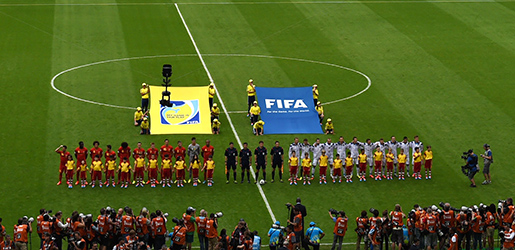Nutritional Strategies for Ramadan
Nutritional Strategies for Ramadan


by Rebecca Roberts - 27.06.14
This year the Islamic month of fasting, Ramadan, begins on June 28th with observant Muslims expected to refrain from eating and drinking from dawn until sunset. For elite athletes, the nutritional impact of this is important to get right so performance and recovery isn’t affected.
Those competing at major events, such as the Football World Cup in the hot and humid conditions of Brazil, during Islam’s holy month, are likely to utilise nutritional expertise to help them maximise their fuelling and hydration as well as tactics to use whilst fasting.
eis2win.co.uk spoke to EIS Performance Nutritionist Emma Gardner about what strategies athletes may use.
“The challenge nutritionally for athletes through a fasting period is trying to maintain energy levels, hydration status, and recover sufficiently from training and competition in order to optimise performance and limit the risk of illness or injury” explains Gardner.
These effects, she says, depends on many factors including the specific sport demands but Gardner says the research evidence in this area indicates that athletes can maintain performance during Ramadan, if physical training, dietary intake and fluid balance are well controlled.
So what strategies will athletes employ during the day whilst fasting?
“For those observing the fast but competing during the day they may look to incorporate strategies such as mouth rinsing or cooling strategies; cool showers, using iced towels, choice of kit etc, particularly if training or competing in warm conditions” says Gardner.
“Sleep is also very important through Ramadan, so having a nap at an optimal time can also be beneficial, particularly if the athletes’ night time sleep has been delayed or interrupted.”
These coping strategies are best to be tried and tested prior to fasting, where possible, to help the athlete adjust to the change in conditions.
When it comes to food and fluid intake, planning the what, when and how much is key to the success of maintaining performance.
“Suhour (the last meal before the beginning of the day’s fast) should be eaten as close as possible to sunrise and athletes should choose foods carefully in alignment with their activity for the day” explains Gardner.
“Low glycaemic index carbohydrates are encouraged in this meal, as well as a quality source of protein and unsaturated fats to help delay gastric emptying and help provide the athlete with a slow release of energy.
“After Itar (the break of fast), especially for recovery after the days training or competition, carbohydrate rich foods are encouraged, as well as some fast absorbing protein to help optimise recovery and repair.”
Gardner says athletes may take on excess fluids during sundown, around 6 litres, to ensure they are fully hydrated for the next day.
“Regular hydration assessment is encouraged for athletes observing Ramadan fasting to understand hydration status through the day and guide rehydration strategies. Sufficient fluids and electrolytes (especially sodium) are encouraged after sunset and before sunrise to ensure full replacement of sweat losses and to prevent progressive dehydration. Alternatively having fluid alongside meals can also help retain the fluid consumed and avoid excess diuresis”
Whilst fasting is obligatory for adult Muslims, there are numerous exceptions including those who are travelling, so many athletes overseas competing may choose not to observe it for this reason. However for many, getting the right bespoke strategy in place which works for them plays an important role in ensuring athletes are best prepared to perform.
Photography © Getty Images